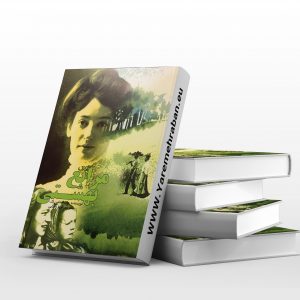Description
Introducing the book A Country Doctor by Franz Kafka
The Village Physician wins two short stories by German author Franz Kafka (1883-1924) as well as critiques and analyzes of these stories by German literary critics.
A Country Doctor is a short story by Franz Kafka, first published in 1918. The story of this work begins on one of the cold winter nights. The man who is the village doctor prepares to go on a long journey to be examined for a very serious illness.
But before he sets off, he faces problems. His horse died last night and now no one in the village is willing to lend him a horse. When the doctor angrily knocks on the door of the pigsty, an unknown man appears inside the pigsty. The mysterious man gives the doctor two horses and prepares a carriage for him. Before leaving, something causes the doctor to want to return home to help his servant, but suddenly, the horses get out of his control and, in the blink of an eye, take the doctor to his destination. The Village Doctor is a bizarre and fascinating story by Kafka that will delight many of the great author’s fans.
The Village Physician, unlike many of Kafka’s three short stories and novels published after his death (1924), was first published in 1919 at the same time as “In the Punishment Group” and four years after his “Metamorphosis”. The author was arranged and handed over to the publisher. Its stories originated between 1914 and 1917, at the height of Kafka’s creativity. During this period, Kafka more or less completed the novel “Trial” and wrote exemplary stories such as “Gracus the Hunter”, “In the Punishment Group” and “The Great Wall of China”. Among the stories in the “Village Physician” series, the allegory of “Before the Law”, an extract from the novel “Trial”, “Dream”, another writing to end it, and “The Message of the Empire” have been the core of the long and unfinished story “The Great Wall of China”. However, Kafka separated the three from their original framework and included them independently in The Village Physician.
A Country Doctor is a collection of short stories, most of which were written in 1917 by Franz Kafka. The name of the book is taken from one of the stories in this collection. Kurt Wolf Publishing published this work in 1919. Kafka dedicated the book to his father. Kafka recounts his father’s reaction to Max Brod when he presented his book to his father: “When I informed him, he said, ‘Put it on my bedside table.'” All the stories in the work have one thing in common: The story of an unusual event occurs, which is sometimes considered a “Kafka paradox”.
In an excerpt from the story of the village doctor, we read:
“I was in a very bad situation: I had an urgent trip ahead of me; Illness in dire straits in villages ten miles away awaited me; Heavy snow and storms filled the vast space between me and him; I had a light carriage with big wheels, right on the roads of our village; Fur coat, medical bag in hand, ready to travel in the yard; But there was no horse, yes a horse.
Last night my horse had an abortion due to the pressure of hard work in this icy winter; My cousin was now looking everywhere in the village to borrow a horse; But there was no hope, I knew. I stood there in vain as the snow covered me more and more, and my mobility diminished. My thick tail appeared at the gate of the courtyard, alone, shaking the lantern; Of course, who would lend his horse for such a journey at this hour? I patrolled the yard once more; I could not; Confused and annoyed, I kicked at the worn-out pigsty that had been unused for years. The door opened and roared back and forth. The air was warm and smelled because the smell of horses came out of it.
In the pigsty, a lantern hanging on a swinging rope beats. A man squatting in a wooden post office room showed his wide blue eyes. “Should I get the carriage ready?” He asked, crawling on all fours and approaching. I did not know what to say, I just bent down to see what else was in the pigsty. “One does not know what he has in his house,” said the bully standing next to me.
Kafka is a writer well known among critics and literary critics as the narrator of the dream world, and of course most of his nightmares, and this is a reputation for the man who struggled with insomnia for most of his short life. It is interesting.
In fact, it can be interpreted that Kafka’s dreams, due to his lack of sleep, had shifted their arena to his realm of awakening and awakening, and that is perhaps why he found this unique ability to be so vivid. Tell them in the form of long and short stories.
Among these masterfully developed and written dreams, the structure of the dream in “The Village Doctor” has received less literary interference and the author has made less effort to make it “real”. That is why when we read it, simply and from the very first paragraphs, without anything extraordinary happening, and just by looking at the narrative form, we realize that we are dealing with a dream. This does not happen even in Kafka’s most shocking story, The Metamorphosis, which is the author’s most famous work.
Franz Kafka Franz Kafka was born on July 3, 1883, in Prague. A German-speaking Jewish writer with a nightmarish world that originated from his anxious, frightened, and wounded soul, which continued to fade in the heart of the society in which he lived and the spirit of a time with which he was alienated and unresolved in its sluggish disproportion. And finally left it in a painful twist and was swallowed. Many of his works were published after his death, which he owes to his lifelong friend Max Brod.
The Unfinished Palace, America, The Trial, A Letter to the Father, The Convicts, The Semi-Complete Story of the Great Wall of China, The Diary, and The Village Doctor are brilliant works after Kafka’s death. His life time was published.
Kafka told his father the story of the A Country Doctor. The stories and the strange and eerie world that Kafka creates break down the earthly boundaries of realism and create a nightmare and surreal world that ends in inevitable destiny in the domination of invisible power.
Franz Kafka, who considered himself a coward, hesitant and restless, due to his physical weakness and severe mental weakness; He suffers from a severe inferiority complex towards his father. In a letter to his father, Kafka wrote:
The world, in my opinion, is divided into three parts: one is that I, the slave, lived in it, under laws that were invented just for me, and I did not know why I could never adapt to them. (This view of Kafka is shown in the story before the law).
The second world was miles away from me. The world you lived in. Involved to rule, to give orders, to be involved in the inconvenience caused by these lack of orders; And finally the third world in which the rest of the people lived. Happy and free from commanding and obeying.
Psychoanalysts believe that man derives his image of God from his experience with his father without knowing it. – So it means God embodies the example of the father. – The opposite is also true, which was first mentioned by Heinz Pulitzer.
That sensitive people like Kafka, with the experience they gain from the concept of God in their mature years, expand and enrich the image of the Father. In one of the mystical sects of Judaism, Kabbalah, a special image of the world of divinity and the realm of “Jehovah” is presented.
This means that if the whole world rips itself in front of the holy and glorious realm of “Yahweh”, he will not care about man. It is an out-of-reach area and there is never a self like Christianity, which is the divine kingdom within you, or Islam, where God is closer to man than the jugular vein.
Something like Kafka’s relationship with his father, which portrays Jehovah as a father. Kafka never liked me internally, and with the harsh diets he inflicted on his body, loneliness, excessive isolation, and persistent insomnia, he developed a kind of psychosomatic illness that caused symptoms of tuberculosis throughout the year. 1917 appeared in him.
This type of illness is a mental illness that becomes a real illness and physical pain due to repeated indoctrination in a person, and often in people who have severe deficiencies in falling in love and making love, the possibility of getting it is increased.
Synopsis of A Country Doctor
The story of the village doctor was published in 1924 after Kafka’s death, and was first published by the author and the publisher in 1919, at the same time as the publication in the Punishment Group and four years after the transfiguration. In the story of the village doctor, one of Kafka’s brilliant works, we encounter a dark, cold, and icy world that seems to clearly reveal Hedayat’s vision.
The world that Kafka creates in the story of the village doctor is a nightmare world that is in a bitter dream and does not follow the normal rules of time and place in the real world.
A surreal story with the indigestible laws and powers of violent human relations that is narrated from a purely mental point of view and manifests the fluid flow of the mind based on an inner monologue that sometimes takes the form of a soul hadith. On a winter night when it snows heavily, the old village doctor is called to the bedside of a young man who is seriously ill.
The doctor, who lost his horse a few nights ago due to snow and severe cold, is looking for a horse with his wife in the village to get ready to go to the patient’s bed. When they are disappointed everywhere, the old doctor accidentally opens his house in a pigsty and is confronted with a nobleman who presents two beautiful horses to the doctor, but in return he decides to take Rosa Nadim’s doctor.
Outraged, the doctor rides his horses to the patient’s bedside, but as if no distance has been traveled, and the patient’s house is a few steps away from the doctor’s house.
The doctor enters the house and encounters the sick boy’s family. At first glance, he does not find the young man sick and only knows that he has become ill; This is while the boy asks him to relieve him and let him die.
Then, when the patient’s sister shows a young bloody handkerchief, the doctor is persuaded to treat the patient more carefully and finds that there is a deep wound on the patient’s side that is bloody and has a worm.
Meanwhile, the horses are sticking their heads out of the window of the room, moaning and urging the doctor to come back. A group of people from the village have also gathered outside and are reciting a strange poem:
Nude him to heal.
If it does not cure, kill it.
Medicine is nothing more than medicine
The congregation eventually stripped the doctor naked and slept in the patient’s bed near his wound and left the room. During this time, a conversation takes place between the doctor and the patient. Patient:
Do you know what? I do not trust you much. Because you were thrown in the same way; You did not come on your own. Instead of helping, you narrow the bed of my death.
And in the next few lines:
I must always be convinced. I was born with a beautiful wound. I do not have medicine, that’s the same.
Doctor: My young friend, your mistake is that you do not have a wide range of opinions. I have visited every kind of disease everywhere around me,
I tell you, your wounds are not as bad as you think. An ax is created with two blows perpendicular to each other. Perhaps those who lay on their sides and do not hear the sound of the ax in the forest, let alone feel it approaching.
The young village doctor accepts the doctor’s words and dies. In the end, the doctor picks up his clothes and equipment and runs away. He rides horses that have no movement and considers himself a deceived doctor who is constantly deceived by the sick;
While the thought of Rosa becoming a victim does not leave her, she finds herself naked, exposed to the frosts of this most miserable age, wandering in earthly carriages and extraterrestrial horses.
1- Introducing the book A Country Doctor on YouTube
2- Introducing the book A Country Doctor in Aparat














Reviews
There are no reviews yet.